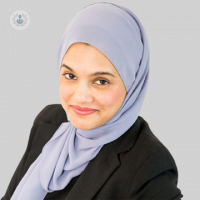Well-woman screening: is it important?
Escrito por:Throughout a woman’s lifetime, her body undergoes many changes. As she gets older she must attend regular check-ups to maintain her health and ensure early detection to optimise her treatment options, if a health issue were to occur. Leading London-based general practitioner, Dr Ferhat Uddin shares her expertise on why well-woman screenings are vital to lead a happy and healthy life.

What is included in a well-woman screening?
A well-woman screening is a doctor-led review of a woman’s health and wellness. A doctor will take into account a patient’s medical and sexual health history and assess her mood and lifestyle before conducting blood pressure tests, alongside necessary physical examinations, like breast checks and gynaecology examinations. Blood screening to measure cholesterol and blood sugar (screening for diabetes) is important as well as hormone and vitamin testing if appropriate.
Why is it important for women to undergo this type of check-up?
Women experience many different life stages when their hormones change drastically. This can have a major impact on her health, perhaps increasing the risk of cardiovascular disease or other conditions.
At what age should women go for their first well-woman screening?
It is advisable to start arranging well-women screenings with your GP around the age of 40. This is the approximate age when women’s bodies begin to change, increasing their risk of developing a health condition. Prevention, where possible, and early detection are important. Of course, cervical screening (smear testing) is recommended from age 25. Breast screening is done from age 50 but can be offered earlier to women at higher risk of breast cancer.
How often should women see a GP for a well woman screening?
An annual review of cholesterol and blood sugars is recommended if any abnormalities are found on initial testing.
Women who are planning on conceiving should see their GP for pre-conception advice, to optimise their chances of a healthy pregnancy.
For women in midlife, hormones can start to fluctuate in the stage of perimenopause. A review annually to discuss symptoms is recommended, to identify this stage of life, as well as to start lifestyle changes and supportive treatment when needed.
If a well-woman screening shows some unusual results, what are the next steps?
If cholesterol or blood sugars are raised, dietary and lifestyle changes are the first step. Medication may be avoided if abnormal results are seen early in the treatment. When your history or blood tests suggest perimenopause or menopause, lifestyle and diet plans are formulated, and a trial of Hormone Replacement Therapy (HRT) may be offered.
If you would like to book a consultation with Dr Ferhat Uddin to have a well-woman screening, you can do so by visiting her Top Doctors profile.


